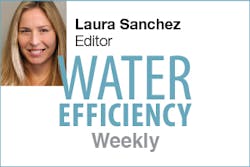At a restaurant inside the Los Angeles County Museum of Art, water sommelier Martin Riese outlines the mineral content, flavor profile, ideal pairing, and origin for each crystalline bottle on the restaurant’s 40-page water menu. Only in California could the subtle differences in a glass of water be celebrated with such pretense.
Californians are particular about their water. So particular, in fact, that inhabitants of the Golden State have balked at the concept of water reuse in the past. However, a new comparative study recently published in the American Journal of Public Health by UCLA’s Fielding School of Public Health revealed that water reuse has the greatest potential to diminish water and energy use, while lowering greenhouse gas emissions and improving the resiliency of the water supply.
When researchers compared California’s current water conservation efforts with two other options—banning landscape irrigation and expanding the use of alternative water sources like desalination and recycled water—the results were overwhelmingly in favor of reusing water.
They found that bans on landscape irrigation can help conserve water and energy, but that limits on irrigation use can also eliminate green spaces, which are beneficial for public health. When they reviewed desalination, the researchers found that the technique uses 50% more energy than importing water, and is 120 times more energy-intensive than getting water from the Los Angeles Aqueduct. The data indicated that recycling graywater is the most effective solution.
“Among the water conservation strategies evaluated, expanded use of recycled water stood out as the water conservation strategy with potential to reduce water use, energy use, and greenhouse gas emissions, with relatively small negative impacts for the public’s health,” the study’s abstract reads.
Hilary Godwin, a co-author of the study and a UCLA professor of environmental health sciences, stated in a Water Technology article that the “Expansion of recycled water use has a tremendous potential to positively impact health. Recycled water is often perceived to be dirty or unhealthful, or associated with the moniker ‘toilet to tap.’ Our research helps change this conversation.”
Spurred perhaps by the effects of drought, that conversation already reveals significant evolution. A separate study recently conducted by water technology provider, Xylem, indicates that Californians are now ready to embrace recycled water. When researchers from Edelman Intelligence surveyed 3,000 people they found that 42% were very willing to use recycled water in their everyday lives and an additional 41% are somewhat willing. Perhaps most significant is the fact that 76% of Californians believe that recycled water should be used as a long-term solution for managing water resources, regardless of whether a water shortage continues.
What are your feelings about water reuse? Have you embraced the concept of recycled water?
